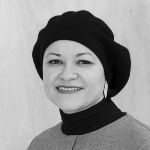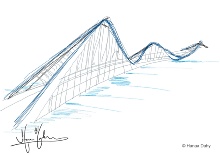Funding
Interreg North-West Europe
EU Funding € 3.93 milion
Total Budget € 6.86 milion
Funding Period
2019-2023
Description
Three bridges made of bio-composites are being built as part of an EU project. Natural plant fibres and biopolymers can now be used to create load-bearing structures. This opens up exciting perspectives on sustainability and material circularity for future bridge constructions. A Structural Health Monitoring system will ensure structural safety and provide new insights into the use of the materials in load-bearing structures.
Combatting climate change and striving for circular economy are becoming increasingly important in the construction industry. Load-bearing structures in particular offer great potential, especially if they are based on renewable, non-fossil materials. As part of an EU project, three pedestrian and bicycle bridges in Germany and the Netherlands are currently being planned using bio-composite materials. The first bridge will be realised Almere (NL) in spring 2021. This bridge will be part of the Horticultural World Expo (Floriade) 2022, which will take place the following year and will focus on the theme "Cities of the Future". Two other bridges will be placed in Ilsfeld (DE) and Bergen op Zoom (NL).
The so-called "Smart Circular Bridges" are made of bio-composites. Like conventional composites they consist of two materials: natural fibres such - as flax and hemp - provide the stiffness and strength, the bio-resin bonds the fibres together, resulting in a strong and light weight material. Bio-composites offer great freedom of form and enable structurally optimised and resource-efficient, yet elegant designs.
The innovative bridges are created in the context of the Bio-Economy Strategy of the European Union and are supported by the Interreg North-West Europe programme. The project is led by Eindhoven University of Technology, working with a total of 14 partners from science, industry and local authorities to complete the three bridges by 2023. The university is building on extensive experience with bio-based materials. In an earlier research project in 2016 with other partners, it realised a bridge in the Netherlands across the river Dommel with a span of 14 metres.
A sophisticated monitoring system is used in the Smart Circular Bridges. By using optical fibre sensors (FBG-s), the structure and its material condition and also its level of structural safety is constantly monitored. The Structural Health Monitoring system detects structural changes and possible material degradation such as fatigue. It can give an early warning, in case pre-set limits are reached. The in situ collected data of the bridges in the project will be compared to extensive research and laboratory test data, (using accelerated weathering and creep deformation tests). The monitoring system collects information on mechanical response, dimensional changes as well as environmental effects such as temperature and humidity. By combining the laboratory tests with constant in situ monitoring data, not only the highest level of safety for use is guaranteed, but also extensive valuable information is collected for the planning and optimisation of further bridges and other structures.
To achieve maximum material circularity, the recovering of the materials from the bio-composites is part of the research. The project uses renewable resources in an innovative way. Beyond bridge construction, it demonstrates the potential of a climate-friendly bio-economy in the construction industry.
More information: https://www.nweurope.eu/smartcircularbridge (external link)
Team
- TU/e Eindhoven University of Technology (NL)
- KU Leuven (BE)
- FiberCore Europe BV (NL)
- 24SEA BVBA (BE)
Sub-partner: Com&Sens BVBA (BE)
- VolkerInfra (NL)
- Lineo - groupe NatUp fibres (FR)
- University of Stuttgart (DE), ITKE/BioMat
- Centre of Expertise Biobased Economy (NL)
- Vrije Universiteit Brussel (BE)
- Gemeente Bergen Op Zoom (NL)
- Gemeente Almere (NL)
- Gemeinde Ilsfeld (DE)
- Proesler Kommunikation (DE)
- Concrefy b.v. (NL)

Hanaa Dahy
Assoc.-Prof. Dr.-Ing.BioMat Department Director




